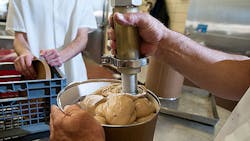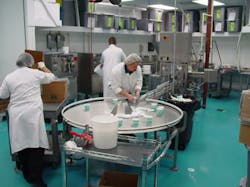Sweetening the Deal With Cost-Effective Third-Party Supply
In food manufacturing and processing, personal protection equipment (PPE) products are essential, and yet because such operations typically have quite narrow profit margins the costs for procuring PPE can be significant. More than that, while the time to source quality, yet affordable, supplies is scarce. However, as in various other examples of manufacturers’ juggling overhead costs, food processors that make efforts to streamline their supply chains not only recover much of the value of their investment, they also are able to return some of the savings back to their businesses.
Third-party suppliers can help manufacturers, fabricators, and processors reduce operating costs via a more efficient supply chain. By relying on such suppliers, for example, a company can eliminate hidden PPE costs and overcome inventory management challenges.
The Unilever ice cream division in Sikeston, Missouri — producer of Good Humor, Breyers, Klondike and Ben & Jerry’s products — is an example of how working with the right supply partner to implement a customized PPE supply chain management service as part of a maintenance, repair and operations (MRO) program can improve both performance and profitability.
When Vincent Sullivan, total productive maintenance manager at the Sikeston location ice cream division, found his old inventory management model was no longer a sustainable practice — it involved bringing in new supplies each month and rolling unused items into the following month — he turned to one of his primary supply partners for a business needs analysis. After all, MSC Industrial Supply Co. (MSC) specializes in the procurement and management of safety and MRO products, and has the experience and efficiency of scale to offer significant cost savings.
Sullivan was looking for a PPE program to protect the company’s 740 full-time employees and hundreds of seasonal workers. He sought a strategic and accurate plan for forecasting how many PPE/MRO supplies he would need at any time to support Sikeston’s 20 ice cream production lines effectively. He needed better visibility of what products and materials he had in inventory, and how the items were being used.
In addition, he wanted to manage the total cost of ownership of that inventory.
According to Peter Kaminski, MSC account executive for Unilever in Sikeston, in the demanding and shifting manufacturing landscape, it is never a good idea to have more inventory than what is absolutely necessary. “It’s all about knowing what you have and how it’s being used that enables you to get better control on your spend,” said Kaminski.
Manage SKUs Better
MSC maintains more than 11,000 SKUs at the Sikeston location. And through its industrial vending and vendor-managed inventory program, MSC helped Sullivan to add inventory on a weekly rather than a monthly basis. As a result, Unilever reduced its inventory-carrying costs significantly because employees must now use up the items before MSC can replenish them.
Unilever in Sikeston uses MSC’s inventory-management system to handle a large number of different items securely. Furthermore, the proprietary software included with the system provides visibility and full inventory management with complete control, reordering, audit trail, and reporting capabilities.
The MSC vending platform handles the Sikeston location’s inventory of regular safety glasses and over-the-glass safety glasses, along with other MRO items. As such, Sullivan has been able to cut the average supply spend on these safety items (as well as on others) by 70%. Because of its success with the MSC platform, he decided to add eight additional vending systems to optimize the process further.
While Unilever, like other manufacturers, is concerned about MRO and specifically, PPE costs, the company is just as equally determined to use quality products for employee safety. It vends approximately 400 pairs of safety glasses per month. According to Sullivan, if one pair of glasses costs more than another but is more scratch- or fog-resistant, he’ll select the higher-priced pair as they typically last longer and end up being more cost-effective in use. “MSC does a lot of the legwork to help me identify safety products that cost less, and then they provide samples so we can test quality [in order to make the best purchase decisions],” Sullivan added.
According to Kaminski, distributor brands, including MSC’s Pro-Safe PPE items, also can bring significant savings to manufacturers. He said it is always a good idea to work with a supplier and ask to test a variety of products to compare the cost and quality advantages of each. “The savings can add up quickly,” said Kaminski. “Overall, Unilever is saving thousands of dollars annually by choosing our exclusive Pro-Safe line of products.”
“I’m huge on service,” said Sullivan. “I can’t research all the products that are out there myself. The level of insight at MSC is higher than at any other company I know. I have not worked with a company that cares as much about saving me money than MSC does.”
Optimizing Price and Product Quality
The Pro-Safe nitrile blue gloves from MSC are an ideal example of better price and better quality. Because Unilever is a food-processing operation, with strict standards for product quality and cleanliness, the company goes through approximately 1,200 boxes of 100-count gloves per week. Before switching to the Pro-Safe brand, Unilever was spending a substantial amount of money annually for latex gloves, but once they started using the Pro-Safe product, they cut that spending level in half.
Sullivan now confirms that Pro-Safe gloves offer exceptional tear resistance, which make them a big factor in Unilever’s performance and cost savings.
Other supply chain efficiency improvements Unilever has incorporated into its operations with the help of MSC are a vendor-managed inventory program, or VMI, and supplier consolidation.
The VMI program maintains full control of the supply ordering process and spending levels for Unilever. MSC assigns a VMI specialist to manage Unilever’s supplies by identifying, labeling, establishing minimum and maximum numbers, and providing a recommended requisition. In this way, Unilever achieves more accurate inventory levels, which in turn enables the company to reduce its inventory-carrying costs by having products on hand only when they are needed.
According to Kaminski, by working with fewer suppliers, MSC can reduce the total cost of ownership in relation to its supplies, as well as eliminate unnecessary purchase order costs. For example, if a manufacturer buys a suction cup from a particular vendor and only spends $50 per year with said vendor, it could cost the manufacturer up to $2,000 per year just to maintain that vendor in its procurement system.
“MSC goes to great lengths to ensure that every procurement person at Unilever understands the significant cost savings that result from adding an item to an already existing PO from MSC, as opposed to establishing a new PO for a separate vendor,” said Kaminski.
Kaminski added that the procurement game has changed in that it is difficult to find major cost savings in choosing one brand of product over another. “You may save a dime on cost per unit, but the savings are much more substantial when you consolidate vendors and streamline your procurement processes,” said Kaminski.
MSC also partners with Unilever by conducting classes for all Unilever employees involved in the budget process. These interactive sessions provide attendees with buying tips for streamlining procurement operations and reducing total cost of ownership.
The Unilever ice cream division in Sikeston demonstrates that manufacturers can enjoy sweet savings when they streamline their PPE supply chain by understanding hidden MRO costs. In fact, when manufacturers improve the visibility of their inventory and consolidate their supplier base to fewer, more strategic relationships – just like Unilever did—they too can simplify their supply chain, reduce operating costs and achieve a more sustainable competitive advantage.

